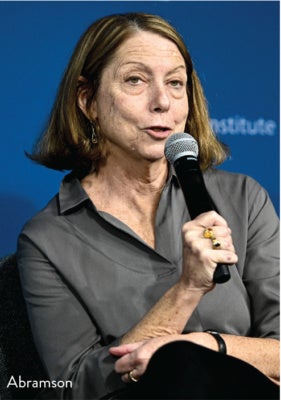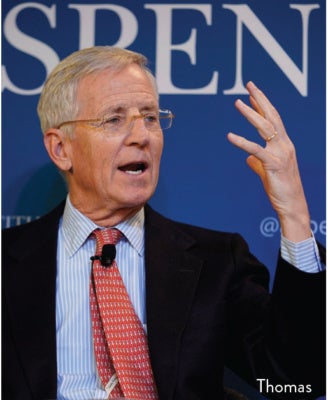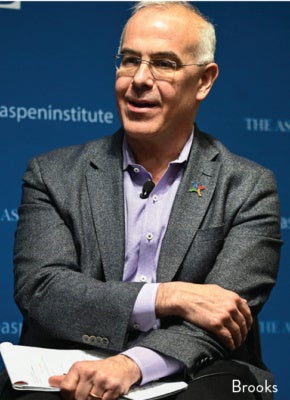This spring’s Alma and Joseph Gildenhorn Book Series explored the news industry, the Supreme Court, and the self. As often is the case with Institute book talks, these seemingly disparate topics all connected under a universal theme: the plight of doing the right thing—whether that’s in public, at work, or in private. Below are just a few highlights from the series.

MERCHANTS OF TRUTH: THE BUSINESS OF NEWS AND THE FIGHT FOR FACTS
Jill Abramson
Former executive editor, The New York Times, and senior lecturer, Harvard University
“There’s a lot more competition for all the news platforms. If you use The Washington Post app, you can see that there’s the clickbait news there, too—something like, ‘A mother dropped her son into a sinkhole and you’ll never guess what happened next.’ I mean, you gotta click. The ‘guess what happened next’ frame for a headline comes straight out of Buzzfeed. It’s not like it’s the worst crime in the world to have clickbait stories as long as the other stories are excellent and important, which for the most part they are. It’s just that The New York Times and others have lowered the wall between the news side and the business side. That blurring is somewhat worrying to me.”

FIRST: SANDRA DAY O’CONNOR
Evan Thomas
Journalist, historian, and author
“She applies to 40 law firms all through California—in LA, San Francisco—and not a single one will give her an interview for a law job. One law firm, Gibson, Dunn & Crutcher, interviews her for a secretary’s job, and she is asked, ‘How well do you type?’ Her answer is, ‘So-so.’ Now flash forward 30 years. It’s 1981, the attorney general of the United States, William French Smith, who was a former Gibson, Dunn & Crutcher partner, is calling Sandra Day O’Connor in Phoenix to ask her if she would please come to an interview with the president of the United States about a job in the Supreme Court. She gets on the phone and she says to him, ‘You wouldn’t be calling me about secretarial work would you?’ ”

THE SECOND MOUNTAIN: THE QUEST FOR A MORAL LIFE
David Brooks
Executive director, Weave: The Social Fabric Project, and op-ed columnist, The New York Times
“The first component of joy is moving in unison with other people. At every celebration in every society, when they’re celebrating, they’re doing rhythmic dance. They’re dancing around a fire; they’re dancing in a synagogue hall; they’re dancing at a party. The second component of joy is that group movement in pursuit of an ideal, in pursuit of something that satisfies our moral yearning. When you see people at the peak of their second mountain, it’s not that their desires have been satisfied but that they are all desire. They’ve found something that is truly meaningful and truly important to them. The self has been left behind, and they long to be more and more in service of that thing, a faithfulness to something they really care about and want to live out. And that’s the second mountain.”